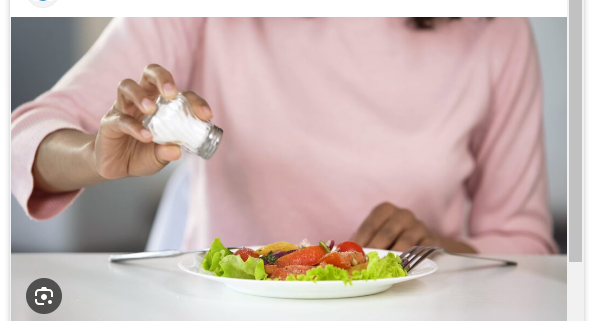Salt is both good and bad for the body. The body needs some amount of salt for normal functioning. But when the it exceeds the required limit, chances are that heart, kidney and other non-communicable diseases set in.
In 2017, an estimated 100,000 deaths occurred in Nigeria due to cardiovascular diseases (Diseases that affects the heart and blood vessels), according to data shared by the University of Abuja Cardiovascular Research Unit.
A more recent data by the Non-Communicable Diseases Alliance, put deaths related to cardiovascular and other non-communicable diseases in Nigeria at about 12%. “Many of those deaths could have been avoided with reduction in salt intake,” said a physician, Dr Jerome Mafeni who is also member of the board of trustees of Network for Health Equity and Development.
In a training on salt reduction organised for journalists by Corporate Accountability and Public Participation Advocacy (CAPPA) on Thursday in Lagos, Dr Mafeni said while salt is essential for living, there must be a conscious habit of reducing its intake so that it doesn’t become injurious to normal health.
Said he: “We need salt. Salt is part of our daily lives. Without salt we cant survive. We are not saying that you should not eat salt. The key operational word is to reduce.”
The abuse of salt
According to the World Health Organization (WHO), the recommended limit of salt per day is 5 grams (a leveled teaspoon.) But Nigerians consume on average a double of that, which is about 10 grams.
Dr Mafeni explains where this excess salt comes from. “Salt is used as a preservatives for food whether for meat, for fish, or any type of food you want to preserve. People eating kilishi (dried meat), suya (smoked spiced meat), you have plenty of salt. Most of your cans foods, you have plenty of salts in them to serve as preservatives.
“ When women cook, they boil the meat with plenty of salt. And when they finish with all that salt, they carry all the water and still pour it into the soup. And after the soup has been cooked, they will still add salt again. So, we’ve been acculturated to play with salt. And that is what has been killing us,” he said.
The problem with salt
Dr Mafeni added: “The reason why salt is so closely associated with cardiovascular diseases is because salt regulates the ability of the body to maintain osmosis. So, if you take too much salt in your diet, your body draws in plenty of water into your blood system. When it draws in plenty of water into your system, you have your vessels expand and you have plenty of blood volume passing through your heart, passing through your blood vessels that put extra pressure on the heart. And that is what leads to blood pressure.
“Once you start having blood pressure, many things go wrong thereafter because the increased pressure of the blood on your various organs begin to give the organs problem.
“High blood pressure passing through the kidneys causes kidney disease. High blood pressure passing through the brain causes stroke. High blood pressure passing through any organ in your body causes its own problems. The longer you have this high blood pressure, the more organs in your body begin to damage. And when organs in your body are damaging, and the body is trying to repair the damages occurring, sometimes the repair gets out of hand, then you get cancer or you get kidney failure.”
CAPPA’s executive director, Akinbode Oluwafemi said the reason for organising the training on salt reduction for journalist, is to limit the deaths arising from these deaths.
He said: “ You will recently observe in the social media a trend of crowdfunding for people with ailments related to non-communicable diseases. This is because our health facilities are not well equipped to address some of these problems. Some of these problems are extremely capital intensive to treat and many families don’t have access to health insurance. They pay out of pockets. And so this lifelong diseases stare us in the face and people do crowdfunding. A lot of them sadly do end up in fatalities. So, our role as civil society groups is to help the public to understand the dangers in some of our dietary cuisines and to make people live healthy lifestyles.”
In her presentation, Vanessa Alfa of the University of Abuja Cardiovascular Research Unit, identified lack of knowledge of risk posed by excess salt in food, Customs and cultural tastes for high-salt diets, increased consumption of out-of-home cooked foods, among others as the cause of high salt intake.
She recommended the following as solution in mitigating the consumption of salt in meals; community mobilizations/advocacy on the harmful effects of excess salt intake, Health education through trusted sources (health, education, religious leaders), use of children to support behavior change in home cooked meals, improving nutritional labelling, public education on how to interpret labels and standardize, clarify, and simplify label formatting.
Bukola Olukemi Odele, a Food & Nutrition Scientist and programme officer for Cardiovascular Health at CAPPA, advised the media to make salt reduction a priority issue on the public agenda, increase awareness about the public health and economic consequences of high salt intake, educate the public on practical ways to reduce salt consumption, deliberately use data and information received from collaborators to shape public opinion about salt reduction, among others.








More Stories
Nigerian man receives Cambridge University award for research on Nigeria-Biafra Civil War
Gay allegation: VeryDarkMan accuses Nedu of blackmail, shows evidence
Nigerian Army orders probe of driver who ran over soldiers in Lagos